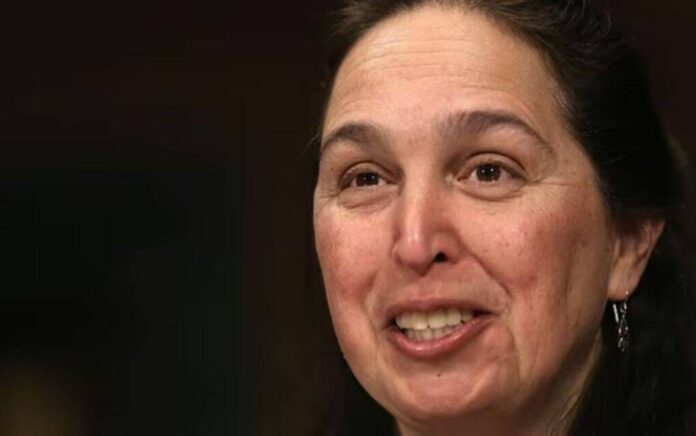
All the secrets are finally being unveiled. The skeletons in this judge’s closet are quickly being shown the light of day.
And this anti-Trump Judge’s suspicious ties to Obama have been uncovered in a shocking exposé.
Federal Judge’s Political Ties Raise Questions About Impartiality in Trump Immigration Ruling
A federal judge with a history of supporting Democratic causes has put a temporary halt to President Donald Trump’s plan to end the legal protections for roughly 530,000 migrants from Haiti, Venezuela, Nicaragua, and Cuba. United States District Judge Indira Talwani’s decision marks another chapter in the ongoing clash between the Trump administration and a judiciary often seen as leaning left, raising fresh concerns about the influence of political affiliations on the bench.
Talwani, appointed by former President Barack Obama, issued a ruling that blocks Trump’s move to revoke the temporary legal status granted to these migrants under the Biden administration’s immigration parole program. This program allowed hundreds of thousands to live and work legally in the United States, contributing to significant demographic shifts in places like Springfield, Ohio, and Charleroi, Pennsylvania, where Haitian migrants have settled in large numbers. For now, Talwani’s decision prevents the administration from issuing removal orders, leaving the migrants’ status in limbo.
Public records reveal Talwani’s deep ties to Democratic politics. She donated $1,725 to various Democratic candidates and the party, including $1,000 to former Senator John Kerry, $350 to Senator Elizabeth Warren, $100 to Obama, and $275 to the Democratic National Committee.
Beyond financial contributions, Talwani disclosed in her Senate questionnaire that she actively volunteered for Democratic campaigns. She knocked on doors for Obama’s 2008 presidential run, canvassed for Warren’s 2012 Senate bid, and supported former Massachusetts Governor Deval Patrick in 2006 and Senate candidate Martha Coakley in 2010.
Talwani’s rulings have consistently challenged Trump’s immigration policies. Earlier this year, she required the Department of Homeland Security to notify the court before deporting Rumeysa Ozturk, a Turkish national whose visa was revoked due to her participation in anti-Israel protests.
In 2019, Talwani sided with plaintiffs who argued that allowing Immigration and Customs Enforcement (ICE) agents to arrest illegal aliens on Massachusetts courthouse grounds would deter witnesses and victims from participating in court proceedings. Her ruling effectively barred such arrests, complicating immigration enforcement efforts.
Her judicial influence extends beyond immigration. In a notable case, Talwani upheld a school district’s decision to send a middle school student home for wearing a t-shirt stating “there are only two genders.” The district argued that the shirt “invades the rights of others,” and Talwani agreed, affirming their authority to enforce the dress code and discipline the seventh grader.
Talwani is not alone in her opposition to Trump’s agenda. Other federal judges with similar political leanings have issued rulings that impede the administration’s priorities. United States Circuit Judge Patricia Millett, for example, upheld an injunction against Trump’s use of the Alien Enemies Act to fast-track the deportation of criminal illegal aliens.
Millett has donated over $31,000 to Democratic candidates. Likewise, United States District Judge James Boasberg, whose injunction Millett upheld, is married to the founder of a Washington, D.C.-area abortion clinic and has donated more than $11,000 to Democrats, including Hillary Clinton during her 2016 campaign against Trump.
The Weight of Unelected Judges
The Trump administration’s efforts to implement its policies have repeatedly been stymied by federal judges, many of whom were appointed by Democratic presidents and hold lifetime tenure.
These unelected officials wield significant power, often acting as gatekeepers to executive actions. Their rulings can delay or derail initiatives, particularly on contentious issues like immigration, where ideological divides run deep. For Trump, this pattern has become a recurring obstacle, as judges with clear partisan histories issue decisions that align with opposing political views.
The influence of these judges extends beyond individual cases, shaping the national policy landscape. Lifetime appointments mean their impact can persist for decades, long after the administrations that appointed them have left office.
Critics argue that this dynamic undermines democratic accountability, as unelected judges override the will of elected officials
As the administration navigates these legal battles, the role of judicial impartiality remains a flashpoint. With judges like Talwani, Millett, and Boasberg issuing rulings that consistently challenge Trump’s priorities, questions about the judiciary’s role in a polarized era are unlikely to fade.
For now, the administration must contend with a system where unelected judges hold the power to shape the nation’s future, often in ways that reflect their own political pasts.
Stay tuned to The Federalist Wire.



















